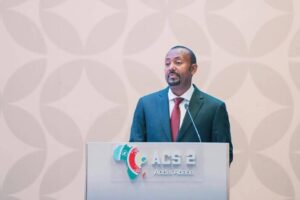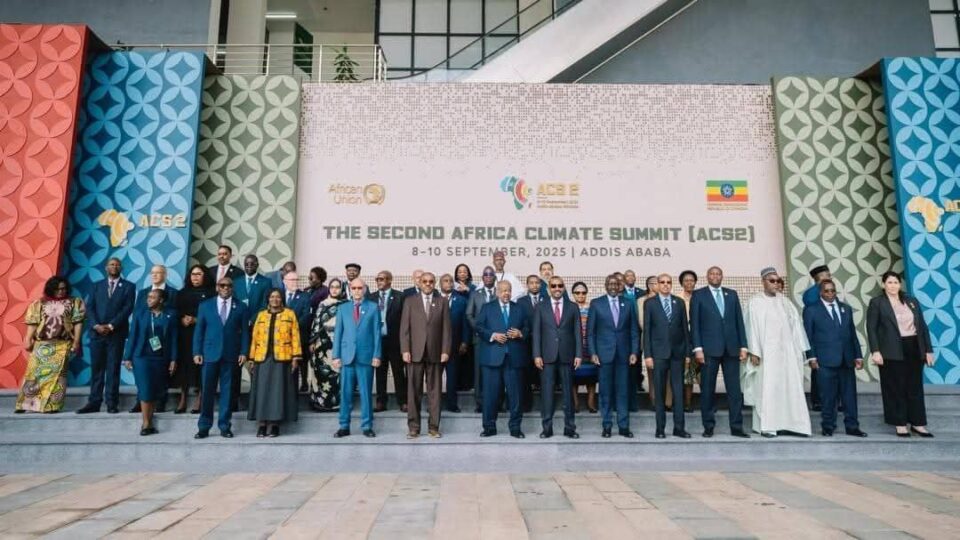

Addis Ababa, Ethiopia – 8 September 2025. The Second Africa Climate Summit (ACS2) officially opened in Addis Ababa, bringing together African leaders, ministers, diplomats, and international partners. The event, co-convened by the Federal Democratic Republic of Ethiopia (FDRE) and the African Union Commission (AUC), runs under the theme:
“Accelerating Global Climate Solutions: Financing for Africa’s Resilient and Green Development.”
This summit emphasizes Africa’s transition from climate vulnerability to climate leadership, positioning the continent as a driver of global green solutions.

Prime Minister Abiy Ahmed: “We Are Not Here to Negotiate Our Survival”
In his keynote address, H.E. Prime Minister Abiy Ahmed urged the world to redefine Africa’s role in global climate action.
“Too often, Africa’s story at climate summits begins with what we lack: finance, technology, time. Let us begin instead with what we have,” he declared.
Africa’s Key Climate Assets:
- The youngest population in the world, rich in creativity and innovation.
- The fastest-growing solar belt on Earth.
- The planet’s last great carbon vaults: forests, wetlands, and coasts.
- Vast arable land to feed Africa and the world.
Abiy also highlighted Ethiopia’s Green Legacy Initiative (48 billion trees planted in seven years), the Climate Resilient Wheat Initiative, and the upcoming Grand Ethiopian Renaissance Dam (GERD), which will generate 5,000 MW of clean energy.
“We are not here to negotiate our survival. We are here to design the world’s next climate economy,” he concluded.
Ethiopia also officially announced its candidacy to host COP32 in 2027 in Addis Ababa, positioning the city as “Africa’s capital of diplomacy and climate ambition.”
AU Commission: Call for Fair Climate Finance
H.E. Mahmoud Ali Youssouf, Chairperson of the African Union Commission, called for equity and justice in climate finance.
He insisted that Africa’s climate vulnerability, combined with debt and global financial inequalities, requires:
- A robust Loss and Damage Fund,
- Fair management of carbon credits under an international authority,
- Renewal and redirection of the Green Fund toward continental climate projects.
“Carbon credits must not be managed at the discretion of polluting states,” he emphasized.
President William Ruto: “Africa Is a Source of Solutions”
H.E. President William Ruto of Kenya praised Ethiopia for building on Nairobi’s momentum after the first Africa Climate Summit in 2023.
“In Nairobi, we framed Africa not as a victim but as a continent of opportunity and solutions. Climate action is not a burden; it is a driver of economic growth, transformation, and jobs,” he stated.
Ruto also stressed the importance of unity and cooperation:
“No nation can solve this crisis alone. Bold, sustained cooperation is essential. Isolation is not a winning strategy; it is courting failure.”

African Climate Innovation Compact (ACIC) Launched
Prime Minister Abiy unveiled the African Climate Innovation Compact (ACIC) a continent-wide partnership that brings together universities, startups, rural communities, and innovators.
Goals by 2030:
- Deliver 1,000 African climate solutions in energy, agriculture, water, transport, and resilience.
- Mobilize $50 billion annually through blended financing.
- Create millions of green jobs and boost economic growth.
- Position Africa as a net exporter of climate solutions, aligned with Agenda 2063, the Paris Agreement, and the SDGs.
Key Takeaway
The Second Africa Climate Summit marks a turning point: Africa is no longer only a victim of climate change but a global leader of climate solutions. From Ethiopia’s bold initiatives to continental partnerships like ACIC, Africa is positioning itself as the engine of the next green economy.
By Emebet Asefa, Correspondent
Addis Ababa, Ethiopia




